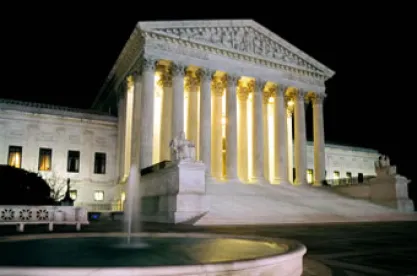On March 19th, the Supreme Court eliminated a tool that copyright owners have considered important to stopping distributors and retailers from importing their copyrighted goods into the U.S. that were manufactured and sold abroad – often at lower prices – in a practice known as parallel importation. The “first sale doctrine” has always prevented copyright owners from restricting a buyer of genuine copyrighted works manufactured in the U.S. from reselling them, but until now most courts did not apply this doctrine to copyrighted works made abroad. In Kirtsaeng v. John Wiley & Sons, Inc., the Supreme Court held that the first sale doctrine also applies to copies of a copyrighted work manufactured abroad.1 As such, regardless of whether a copy of a copyrighted work is manufactured domestically or abroad, once the copyright owner sells the copy to another, the first sale doctrine now allows others to buy the copyrighted work abroad and import it into the U.S. This holding will significantly impact price differentiation strategies as well as the market for parallel imports.
EXCLUSIVE RIGHTS AND THE FIRST SALE DOCTRINE
The Copyright Act provides the owner of a copyrighted work with various rights, including the exclusive right to distribute copies of the work2 and the right to prohibit unauthorized imports of copies of the work.3 However, the Copyright Act limits certain of these rights through the first sale doctrine, which provides that once the copyright owner transfers ownership of a copy “lawfully made under this title” to another, the new owner of the copy “is entitled, without the authority of the copyright owner, to sell or otherwise dispose of the possession of that copy.”4 In other words, once the copyright owner sells the copy to another, the copyright owner can no longer restrict the buyer from re-selling or otherwise transferring the copy. The first sale doctrine “exhausts” the copyright owner’s exclusive right to prevent distribution of the copy.
In Quality King Distributors, Inc. v. L’anza Research Int’l, Inc., the Supreme Court held that the first sale doctrine also exhausts the copyright owner’s right to prohibit the unauthorized import of a copy of a copyrighted work once the copyright owner transfers ownership of the copy to another.5 Under Quality King, once ownership of a copy “lawfully made under this title” is transferred to another, the new owner can freely import the copy into the U.S. and can freely distribute the copy without obtaining authorization from the copyright owner. What was unclear after Quality King was the effect of foreign manufacture of the copy on the applicability of the first sale doctrine and, more specifically, the effect of the phrase “lawfully made under this title” of the Copyright Act’s first sale provision when the copy was “made” in a foreign country. That is, does the first sale doctrine only apply to copies of copyrighted works manufactured domestically or does it also apply to copies manufactured abroad?
THE FIRST SALE DOCTRINE APPLIES TO COPIES MANUFACTURED ABROAD
John Wiley & Sons, Inc. is a publisher of academic textbooks, and typically manufactures and sells at least two editions of a given copyrighted textbook—a domestic edition that is sold in the U.S. and a substantially equivalent foreign edition that is sold abroad at a lower price. Supap Kirtsaeng, a college student, had family members in Thailand purchase more than 600 copies of foreign editions of John Wiley & Sons’s textbooks, which were manufactured abroad, and mail the textbooks to Kirtsaeng in the U.S. Taking advantage of the lower prices of the foreign editions relative to the prices of the corresponding domestic editions, Kirtsaeng subsequently sold the textbooks in the U.S. for a profit.
John Wiley & Sons sued Kirtsaeng in the United States District Court for the Southern District of New York for copyright infringement, alleging that Kirtsaeng’s importation of the textbooks into the U.S. without John Wiley & Sons’s consent and Kirtsaeng’s sale of the textbooks infringed John Wiley & Sons’s exclusive right to distribute the textbooks. The District Court held that Kirtsaeng could not rely on the first sale doctrine as a defense because, in its opinion, the first sale doctrine did not apply to copies of copyrighted works manufactured abroad.6 The jury found Kirtsaeng liable for willful copyright infringement, and Kirtsaeng subsequently appealed to the Second Circuit, which agreed with the District Court’s interpretation of the first sale doctrine.7
The Supreme Court agreed to hear the case, and reversed the lower courts based on a combination of the plain language of the first sale doctrine, the historical context of the first sale doctrine, cannons of statutory interpretation, and public policy. It is now clear that “the ‘first sale’ doctrine applies to copies of a copyrighted work lawfully made abroad.”8 Thus, under the Supreme Court’s ruling, once a copyright owner transfers ownership of a copy of a copyrighted work to another, regardless of whether the copy was manufactured domestically or abroad, the new owner may import the copy into the U.S. without the copyright owner’s consent and may redistribute the copy without the copyright owner’s consent. For example, if a used bookstore owner vacations in London and purchases a copyrighted book, the used bookstore owner may freely bring that book back to the U.S. and resell that book in her store without obtaining the copyright owner’s consent, regardless of where that book was manufactured.
IMPLICATIONS
The Supreme Court’s holding in John Wiley & Sons has the potential to significantly impact those who employ a price differentiation strategy when selling a copyrighted work in different markets. Prior to John Wiley & Sons, a copyright owner could manufacture copies of a copyrighted work abroad; sell those copies abroad at a lower price than identical copies sold domestically; and, using the right to prohibit unauthorized imports, prevent those copies from being imported into the U.S. for resale. This allowed the copyright owner to prevent arbitrage—the purchase of copies abroad at a lower price; the importation of the copies into the U.S.; and the sale of the copies for a profit (i.e., at a price higher than the price abroad and lower than the domestic price). The Supreme Court’s ruling, however, eliminates the ability of copyright owners to prevent arbitrage. Thus, copyright owners that currently employ a price differentiation strategy and rely on controlling the location of manufacture to enforce this strategy should now consider other options to do so.
On the other hand, the holding in John Wiley & Sons benefits those who deal in the parallel import market. Prior to the Supreme Court’s ruling, before importing into the U.S. and selling a copy of a copyrighted work purchased abroad, the seller had to first determine whether that copyrighted work was manufactured domestically (in which case the first sale doctrine applied and the copyright owner’s right to distribute and to prohibit imports were exhausted) or abroad (in which case the first sale doctrine did not apply and such rights were not exhausted). After John Wiley & Sons, the seller no longer has to make such a distinction.
The Supreme Court’s ruling may not, however, significantly impact the market for certain parallel imports. For instance, since the first sale doctrine applies when a copyright holder transfers ownership of a copy of a copyrighted work to another, the Supreme Court’s ruling may not affect parallel imports of copies of copyrighted software that are licensed to buyers. In such cases, since the copyright owner does not transfer ownership of the copies to the buyers, the first sale doctrine does not apply. In another example in which a copy of a copyrighted work sold abroad is also protected by a U.S. trademark and there is a material difference between the version sold abroad and the version sold domestically, the importation of that foreign copy into the U.S. and the sale of that copy may be actionable under trademark law.
____________________________
1 Kirtsaeng v. John Wiley & Sons, Inc., 568 U.S. ___ (2013).
2 17 U.S.C. § 106(3).
3 Id. § 602(a).
4 Id. § 109(a).
5 523 U.S. 135, 145 (1998).
6 John Wiley & Sons, Inc. v. Kirtsaeng, No. 08 Civ. 7834(DCP), 2009 WL 3364037, at *9 (S.D.N.Y. Oct. 19, 2009).
7 John Wiley & Sons, Inc. v. Kirtsaeng, 654 F.3d 210, 222 (2nd Cir. 2011).
8 Kirtsaeng v. John Wiley & Sons, Inc., 568 U.S. ___ (2013).





 />i
/>i

